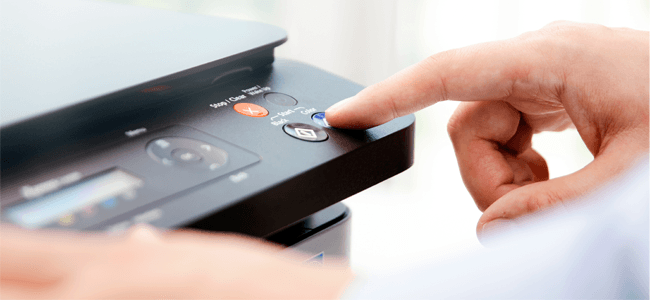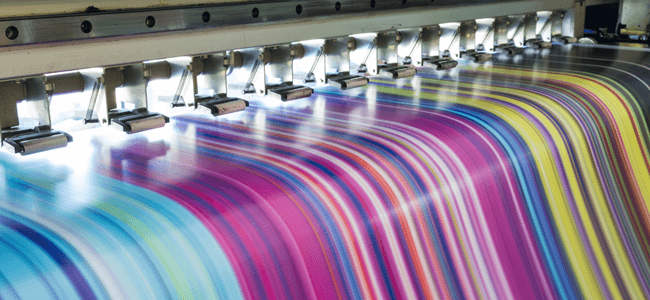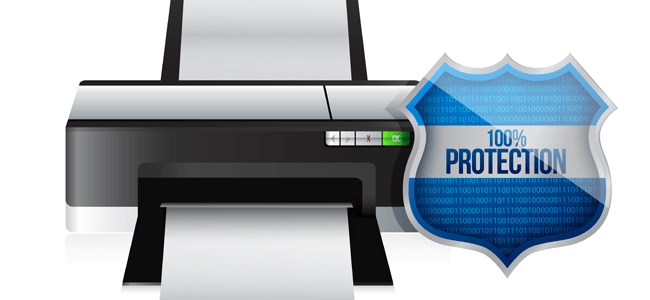
PRINTERS | 7 MIN READ
Whether you use multi-function printers or a fleet of desktop printers in your organization, having the ability to produce high quality printed documents on demand is key in smooth business operations. But the ability to scan, email, redact, print various formats, send through Wi-Fi and more has become just as essential. Buying a multifunction printer is just like purchasing any other piece of technology− it requires careful consideration. Keep reading to learn what factors you should consider when buying a printer.
Note: This article was last updated on March 20th, 2023.
Not enough time? Jump to:
Buy or Lease?
Buying or leasing a copier is really the same thing. Unlike when you lease or buy a car, when you make a copier purchase, you will choose to buy outright or lease the copier (to eventually own it).
Buying a copier outright may save you a few hundred dollars in the long run, but most organizations aren't interested in keeping computer-based technology longer than five years.
It simply becomes out-of-date and obsolete. Leasing can assist with this, as most dealers and manufacturers will offer "buy out" programs near the end of the lease to allow you to upgrade your machine to a newer model for less money.
But what about used copiers? Can value be found in not purchasing a copier fresh off the assembly line?
RELATED: Should I Lease or Buy a Copier: Which is Better?
Should I Buy a Used Printer?
Along with deciding to buy or lease a printer comes the decision of getting a new or used machine.
With new machines, you may not have to worry as quickly about service and repairs. This can save your company some money as well as the headache associated with coordinating machine repairs.
However, with used printers comes the obvious cost savings. Sometimes, printer dealers have used printers in their inventory that are basically new and were quickly returned by a customer because they switched to another dealer, etc. In this case, you can get an almost new printer at a used price!
RELATED: Used Copier: What You Didn't Know
Features
Speed
Depending on your company's monthly print volume, you may value a printer with high speeds. When evaluating a printer for its speed, which is measured in pages per minute, consider how often your employees print and what kind of print jobs they carry out.
Certain print-heavy industries such as law offices are constantly printing large documents. If a law office, for instance, were to get a high quality but slow printer, business operations could be hindered when employees have to wait around for backlogs of large print jobs to finish.
On the other hand, if your employees only print out a few pages every now and then, or your office is very small, you may not value printer speed as much.
Keep in mind, however, that each level of printer speed has a recommended monthly volume. If your printer produces a higher volume than it's rated for, you'll have more service calls than normal. Selecting the correct speed will help to eliminate any future headaches.
Duplex Printing
Printers with this feature give you the option to automatically or manually print on both sides of the paper.
Companies with simple print jobs that only need to print one-sided documents may not value this feature, but those with complex design jobs such as booklets and pamphlets may value duplex printing.
Paper Types
Depending on the types of print jobs your business fulfills, you may value a printer that can handle a larger variety of paper types.
While the most common paper size is 8.5 x 11 in., also known as A4, many printers can handle paper up to legal size, or 8.5 x 14 in. Printers that can handle mainly A4 paper can end up being cheaper, so if your office only prints on this type of paper, you can save a little money by going for an A4-friendly printer.
Additionally, consider the paper weight that your office requires in a printer. Heavy paper such as stock paper is typically printed from the bypass tray. However, if your office prints a large volume of documents on heavy paper, consider a printer that can support heavy paper from the standard trays.
Seeking out a printer like this can streamline business operations by saving employees the time spent constantly refilling the bypass tray.
Finishing Options
Some printers come with finishing options that can save your employees time when completing print jobs. Stapling and three-hole punching are two great finishing option to keep an eye out for when evaluating a printer.
If your employees only print a few pages occasionally, your office may not benefit as much from a printer with robust finishing options.
However, if your business is a non-profit, for instance, and is constantly printing booklets and other multi-page documents for large audiences, your business may benefit from a printer that can automatically staple documents.
Laser or Inkjet?

Laser and inkjet are the two main types of printers that a business must decide between. The main difference between the two is that an inkjet printer uses ink to print documents, while a laser printer uses a laser.
However, additional minute differences between the two exist that can lead to discrepancies in speed, image quality, and functionality. Based on your needs, you may favor one type of printer over the other.
Laser printers are best suited for those who:
- Print high volumes of black and white documents
- Need fast printers with large print capacity
- Do not need gallery-quality photo prints
- Need a printer for an office− Laser printers tend to be large and heavy, which makes them less suited for home offices
- Don't mind that toner cartridges tend to be more expensive than ink cartridges for inkjet printers− However, keep in mind that while they're more expensive up-front, they last much longer than ink cartridges
Inkjet printers are best suited for those who:
- Require high-quality images− Inkjet printers have better tonal variety and are better at blending colors
- Print on a wide variety of paper types− Laser printers cannot print on paper that's heat-sensitive, which limits the types you can use
- Don't print that often− These printers tend to be slower and their paper trays may not hold as much
Security
In the age of data breaches and cyber attacks, finding a printer that's not only effective but also secure should be a top priority for your business. Thankfully, many modern printers come with security features to protect company data and keep it out of the hands of cyber criminals.
Follow-Me Printing
Follow me printing makes printing more convenient by increasing security and reducing print waste, which will ultimately control your monthly printing expense.
When this feature is implemented in an office with multiple printers, print jobs are sent to a shared queue instead of a specific machine. Instead of the printer automatically finishing the job, where the document can then sit for anyone walking by to take, it waits in the queue until that employee walks to the printer and manually releases the job from the queue.
Employees can release the job from any printer, which minimizes the number of times an employee is stuck waiting behind another person at the same printer.
Your business can save money too with this feature since print jobs aren't automatically released. Sometimes, an employee may forget to grab a job from the tray or may accidentally print it multiple times. Over time, this can lead to a lot of wasted paper and ink.
Follow-me printing saves documents from being needlessly printed before an employee is ready for it.
Data Encryption Kits
For instance, some newer models created within the last 5-6 years have data security kits that you can enable. These kits can have data encryption functions, which scramble the data stored on your copiers and printers, rendering the information useless to a hacker.
Additionally, on some newer models of brands like Canon and Sharp, data security kits might also have features that, when a document is scanned, copied, or printed, erase those documents from the hard drive sometimes as many as 28 times.
Dealer or Manufacturer?
When finding the right model for your needs, you may be stuck on whether to purchase your printer through a major retailer such as Staples or through a local dealer. Keep reading for an in-depth comparison.
Convenience
Many turn to major retailers for their perceived convenience. Similar to how quick it is to buy all that you need at a one-stop store like Target, being able to walk into a familiar store like Staples or order a printer on their website seems so easy.
However, although you may not be as familiar with a local dealer as you are with major retailers, the process of selecting and ordering a printer can be just as convenient with either type of seller. Usually, you can visit a major retailer and a local dealer's building to test different models in-person.
Additionally, as more people turn to online shopping, the process for purchasing a printer online has become just as simple as ordering a new pair of shoes from an online store, no matter if you go through a major retailer or local dealer.
Service
The level of customer service you experience with a local dealer cannot be beat. In general, small local businesses have lean teams that can really afford to personalize your experience and consistently follow up to ensure that your needs are addressed.
When it comes to printer repair service, local dealers also come out ahead. If your printer breaks and needs repairs, a major retailer like Staples will usually have you ship it away for fixes, which means you could potentially be waiting upwards of a month. Along with being slow, this type of service can also be costly since you pay for a one-time job.
Local dealers build service pricing into your contract, which makes any repairs easier to budget for. Additionally, since your local dealer's shop is located nearby, they can usually send a technician to your location to fix your machine that same day.
Price
While a printer from a major retailer can be cheaper, the prices they charge for cartridges can be as much as five times more expensive than local dealers. Both major retailers and local dealers can negotiate with you for lower prices on machines, but local dealers can keep cartridge prices much lower.
Local dealers try to maintain margins through their service contracts, which is why they value keeping cartridge prices low in an effort to consistently have business with a customer. Major retailers know that a customer may only need a cartridge every few months, which is why they charge so much.
Additionally, when factoring price into the purchase of a printer, consider downtime costs. If your printer purchased from a major retailer breaks, you may be out of a printer for a month while you ship away your printer for repairs. The costs associated with this scenario can quickly add up, as opposed to a local dealer who can usually fix your printer that day.
If you don't print that often and business operations wouldn't be greatly hindered from printer downtime, a major retailer could make more economical sense if their machine prices are lower.
Additional Questions to Ask

When Should I Buy a Copier?
Purchasing or leasing a copier isn't always the right decision for a company. If you're considering a copier purchase, make sure you've completed a cost analysis before reaching out to a vendor.
Candidates that would benefit from a copier lease may include:
- Companies with ten or more printers
- Companies whose printers are in high demand (need to purchase ink and toner often)
- Companies who experience a lot of equipment downtime
- Companies who need additional features and security not offered in desktop models
It's important to note here that there may be savings through managed print services even if you aren't in the market for a copier.
How Much Does a Copier Cost?
We answer this question in greater detail in our article about how much a copier costs, but the short answer is that it depends. Copier purchases can range from as low as $2,500-$60,000 per machine (with production printer being more), and service can range from less than $0.01 to around $0.10 per page (if you are using color printing.
Copier brand, speed, and features all play into the overall cost of your copier, but the true differentiation will be the service you receive by the vendor. For instance, you might be able to get a lower service price, but the savings will be negligible compared to the risk of extended downtime.
Remember, copier dealers who offer you much cheaper services from their competitors experience a trickle down effect. Less money charged, means less money the vendor can spend on training and retaining quality service technicians.
Before purchasing or leasing a printer, consider some of the points mentioned above.
For more printer-related content, follow our blog!
Posted by Bernie Schom

Bernie Schom is the Vice President of Sales at Standard Office Systems and has been in the copier and printer industry for over three decades.

